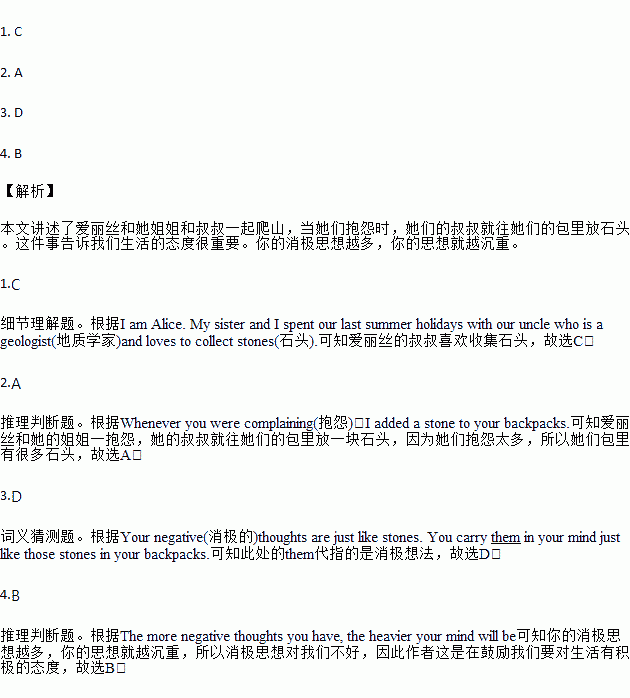题目内容
I am Alice. My sister and I spent our last summer holidays with our uncle who is a geologist(地质学家)and loves to collect stones(石头).
One day he bought us two backpacks(背包)and asked us to go to the mountain with him. We walked the whole day. Every now and then he put stones in our backpacks. To our surprise, he also took some stones out from them. But we thought he had just found better stones.
When we returned to the house, we were very tired. The backpacks were so heavy that we felt relief(轻松)when we took them off. Yet our uncle's backpack was half empty.
"Why did you give us so many stones?" we asked.
"I didn't. You did." he said. "You didn't know it, but I gave you a little attitude(态度)test today. I listened to every word you said. Whenever you were complaining(抱怨),I added a stone to your backpacks. whenever you talked about something with positive(积极的)thinking, I took out a stone. And now look at your backpacks."
Our backpacks were full of stones.
"Your negative(消极的)thoughts are just like stones. You carry them in your mind just like those stones in your backpacks. The more negative thoughts you have, the heavier your mind will be." said our uncle.
With great love, our uncle taught us one of the most important lessons in life—the power(力量) of the attitude.
1.Alice's uncle likes to___________.
A. collect coins B. collect stamps C. collect stones D. collect books
2.Alice's and her sister's backpacks were full of stones because they .
A. complained(抱怨)too much on the way B. were hard working
C. enjoyed collecting stones very much D. chose wrong backpacks to carry the stones
3.The underlined(划线的)word "them" refers to " ________ " in the passage.
A. the stones B. the backpacks C. the positive thoughts D. the negative thoughts
4.The writer wrote this passage to encourage us to____________.
A. be pleased to take others' advice B. have a positive attitude towards life
C. make a plan before doing something D. help people in trouble
 口算能手系列答案
口算能手系列答案
